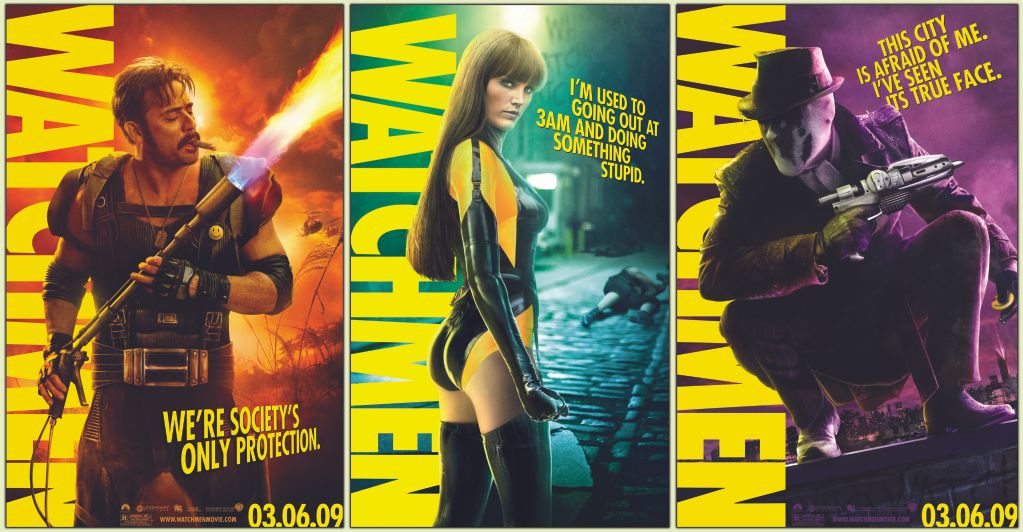
A couple of days ago, I caught the Watchmen movie. The fact that I saw it on a weekday afternoon (a privilege of the Retired Individual) about a month after its release meant that I saw it in a theatre that was completely empty, save for myself.
I am embarrassed to say that I had been unfamiliar with the source material, a twelve-issue series of comic books originally published in 1986-87 and later repackaged as a Graphic Novel. Somehow or other, it never managed to hit my radar screen, even over a two-decade-plus span. Maybe if I spent more time at comics conventions... but no.
When I saw the advance advertising for the movie, I was fascinated. Who were these costumed characters, anyway? (Especially the Silk Spectre - yow!) I had to find out more. And so I resolved to read the graphic novel before seeing the movie.
There’s always a danger in comparing any movie to its Booky Source. Almost inevitably, changes must be made in adapting a book to the Big Screen... and in almost every case, those changes are the source of disappointment and frustration. Sometimes it is the excision of plot elements or characters that make it more difficult to tell a story visually; sometimes it’s a wholesale reimagining that (generally) does little to enhance the story. And, at the very least, converting a book to a film changes it from a “hot” medium to a “cold” one, as Marshall McLuhan might say: from one that forces your own imagination to do the heavy lifting to another in which a director, cinematographer, and actors (among others) have done it for you.
With a graphic novel, it’s a little different. The book is really a form of extended storyboard, a movie in the process of becoming. How do you put it on the screen and manage to give it a life of its own without taking away the graphic impact and the storytelling techniques that work so well on the page? If you don’t know what you’re doing, you can end up with a disappointing clusterfuck like The League of Extraordinary Gentlemen, not incidentally, another Alan Moore creation that, alas, did not fare well in the transition from Page to Screen.
But let’s deal with that later. What about the graphic novel, a novel that received the Hugo Award in 1988 and has been included in Time Magazine’s 2005 list of the best 100 English-language novels written since 1923? Does it live up to the hype? Is it all that?
Watchmen - the graphic novel - is all that.
The story is set in the year 1985, in a world that is similar to our own. But there are a few critical differences, for this is a world in which costumed heroes enjoyed a decades-long surge of popularity that began in the late 1930’s. Not in comic books, as in our own world, but in real life.
These dressed-up vigilantes - for that is, indeed, what they are - are no superheroes. They’re martial-arts experts, some assisted with gadgetry à la Batman, others only by their own brutal capabilities and internal moral compass - or lack thereof. The exception - the only one with real superpowers - is Jon Osterman, AKA Dr. Manhattan, who, owing to a bizarre nuclear accident, now has godlike powers over matter, space, and time.
It is through Dr. Manhattan’s efforts that the Vietnam War ends in a U.S. victory, a victory that propels Richard Nixon to electoral success in five consecutive terms. But meanwhile, under pressure from local police forces, Congress has outlawed the activities of costumed heroes, causing the ones still active to either retire (e.g., Nite Owl, Silk Spectre) or go underground (Rorschach). The exceptions are Adrian Veidt, AKA Ozymandias (“The Smartest Man in the World”), who retired early to build an empire on (among other things) costumed hero action figures; and the brutal, amoral Comedian, who, along with Dr. Manhattan, continues to work under the auspices of the U.S. Government. It is the Comedian who rescues the U.S. Embassy hostages in Iran in this world... presumably in a suitably take-no-prisoners manner.
It’s a world rife with many of the tensions with which we were familiar in the mid-1980’s. The superpowers are at each other’s throats and the threat of nuclear annihilation - kept at bay mainly through the presence of Dr. Manhattan - is in the air. And someone has murdered the Comedian...
I won’t say much more, except that the story is richly layered, incorporating the characters’ respective origins as well as “current” events and told, at times, in brilliant counterpoint, with multiple story elements weaving in and out. And there is one critical “hat tip” towards the end... an element sadly missing from derivative entertainments like the movie Idiocracy. Watchmen honors its sources.
The film? Given the brilliant writing and graphics of the source, the film makes an attempt to capture those elements as faithfully as possible... and mostly succeeds. The story is told in the same contrapunctal style, with a few necessary omissions and (understandable, albeit regrettable) alterations. Some critics have caviled, complaining that the film is too faithful to the source, to the point where it is constricting. I disagree. I think Watchmen, the movie, brilliantly brings Watchmen, the graphic novel, to life.
It’s a violent film, with some genuinely bloodcurdling moments. It’s got sex - that hard “R” rating is well-deserved. It’s dark... darker than any of the Christian Bale Batman movies. It’s a Costumed Superhero movie completely unlike any other, one that knowingly turns the conventions of the genre on their heads while simultaneously paying homage to them. And it is Just. Plain. Fucking. Amazing.
One of the subtexts of both the graphic novel and the film is that the costumed heroes are presented as thoroughly and completely human. Which means they all have a few loose screws... because what kind of person dresses up in a costume in order to beat up on criminals? A Borderline Nutcase, that’s what kind. Even Dr. Manhattan, who is more god than human (and who, during the course of the story, becomes ever more detached from humanity), is thoroughly human at his core. It’s a tribute to Alan Moore’s writing skills - and Jackie Earle Haley’s acting skills - that Rorschach, a character seething with righteous fury and alienation, is perhaps the most heartbreakingly human of them all.
I’m actually glad it took me this long to discover Watchmen. If I had read that graphic novel in the 1980’s and found out that they were going to make a movie out of it, I would have had to suffer years of frustration as the project wound its way through the seven circles of Development Hell. This way, no frustration... except the frustration of knowing that the Missus probably wouldn’t enjoy the film like I did.
If you want to see a Comic Book Movie that is unlike any other... one that makes all those Superman, Batman, Spiderman, and X-Men movies look trivial and childish... one that shows a deep understanding of the World of the Hero... go see Watchmen. You’ll never look at one of those yellow Smiley-Face buttons the same way again.


















No comments:
Post a Comment